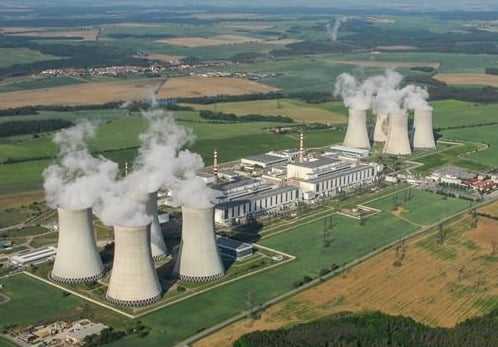Korea Hydro & Nuclear Power (KHNP) has been selected as the preferred bidder for the Czech Republic’s new nuclear power project. The photo shows a view of the Dukovany Nuclear Power Plant in the Czech Republic. (Image Provided by Korea Hydro & Nuclear Power)
SEOUL, May 7 (Korea Bizwire) — South Korea’s landmark bid to export nuclear power plants to the Czech Republic has encountered stiff legal resistance from France, highlighting the intensifying global rivalry in the nuclear energy sector and underscoring Korea’s growing competitiveness.
Led by Korea Hydro & Nuclear Power (KHNP), the so-called “Team Korea” secured its position last year as the preferred bidder for a multibillion-dollar nuclear project in Dukovany, Czech Republic, beating out major competitors such as France’s EDF and U.S.-based Westinghouse.
However, just days before the official contract signing scheduled for May 7, a Czech court issued an injunction prohibiting KHNP and Czech utility CEZ’s subsidiary, EDU II, from finalizing the agreement until a lawsuit filed by EDF is resolved. The French state-owned firm alleges procedural irregularities and questions the legitimacy of KHNP’s bid.
EDF’s legal maneuver follows earlier objections it raised with Czech antitrust regulators, which were ultimately dismissed in April. Its latest move is widely seen as a last-ditch effort to delay or derail the deal. CEZ is reportedly preparing to appeal the injunction.
While EDF claims South Korea’s bid was unfairly supported by state subsidies, KHNP and industry experts flatly deny the allegation, noting that Korea Electric Power Corp. (KEPCO)—KHNP’s parent company—is publicly listed and subject to financial market oversight, making covert subsidies structurally implausible.
Industry analysts interpret the backlash from EDF and Westinghouse not just as legal posturing but as a reaction to Korea’s encroachment into Europe’s nuclear “home turf.” They argue that France and the U.S., with aging supply chains and rising costs, are increasingly threatened by South Korea’s cost-efficiency, supply chain resilience, and project management discipline.
A 2021 report from the World Nuclear Association found South Korea’s nuclear construction costs to be less than half that of France and 60% that of the U.S., measured by per-kilowatt output. KHNP’s edge stems from a robust domestic supply chain, skilled labor force, and consistent track record of delivering projects “on time and within budget.”
KHNP’s proposal for the Dukovany project, estimated to be worth 26 trillion won (approx. $19 billion), builds on its successful delivery of the Shin Hanul Units 3 and 4, which cost 11.7 trillion won. The Czech project would likely double that scale and revenue.
France’s own record has been troubled: EDF’s Flamanville-3 reactor ran 12 years behind schedule, with costs quadrupling to 13.2 billion euros. Its ongoing Hinkley Point C project in the UK is now expected to cost up to 40 billion euros, nearly double original estimates.
“This is not just about contracts—it’s about who defines the future of nuclear energy,” said Chung Bum-jin, a nuclear engineering professor at Kyung Hee University. “If transparency prevails and EDF’s and KHNP’s bids are laid bare, it would demonstrate South Korea’s competitiveness on the global stage.”
As Czech authorities weigh legal appeals, South Korea’s nuclear industry stands at a critical inflection point—tested by global scrutiny but strengthened by its ability to deliver reliable and economical energy infrastructure on a global scale.
Ashley Song (ashley@koreabizwire.com)

